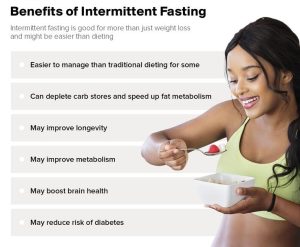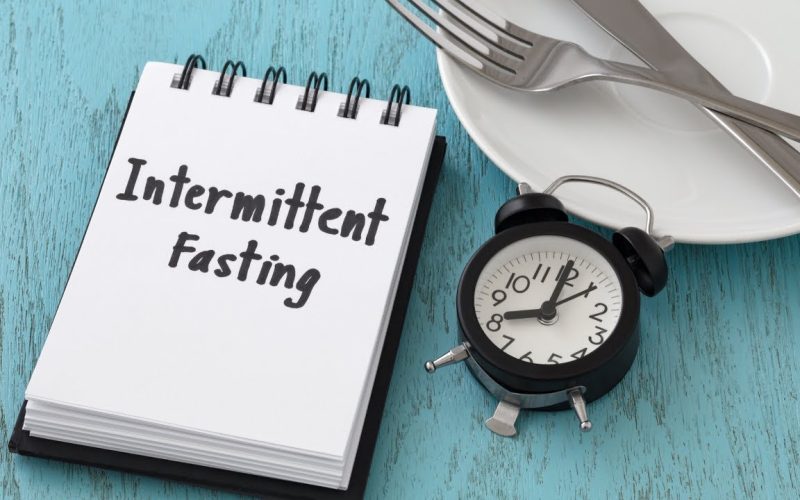Introduction
Intermittent fasting has become one of the most popular health trends in recent years, and for good reason. Beyond just being a weight-loss strategy, intermittent fasting offers a wide range of benefits, from improved metabolism and energy levels to better brain function and longevity. But what exactly is intermittent fasting, and how does it work? In simple terms, intermittent fasting is an eating pattern that cycles between periods of eating and fasting. It doesn’t dictate what you eat but focuses on when you eat. Whether you’re looking to shed a few pounds, boost your mental clarity, or improve your overall health, intermittent fasting might be the lifestyle change you need. In this guide, we’ll dive into the science behind intermittent fasting, explore its many benefits, and provide practical tips on how to incorporate it into your daily routine. Ready to unlock the potential of intermittent fasting? Let’s get started.
What Is Intermittent Fasting?

Intermittent fasting (IF) is not a diet but an eating pattern that alternates between periods of eating and fasting. Popular methods include the 16/8 method (16 hours of fasting, 8-hour eating window), the 5:2 method (eating normally five days a week, reducing calorie intake for two days), and alternate-day fasting.
Tip: Choose a fasting method that fits your lifestyle and listen to your body as you adjust.
Example: “I started with the 16/8 method, skipping breakfast and eating between 12 PM and 8 PM. It was easier to maintain than I expected.”
How Intermittent Fasting Works

Intermittent fasting works by allowing your body to spend more time in a state of fat burning. When you fast, your insulin levels drop, which allows fat cells to release stored energy. Additionally, fasting triggers an increase in human growth hormone (HGH), which helps your body burn fat and build muscle. By restricting your eating window, you give your body more time to burn through the food you’ve already consumed, leading to more efficient metabolism.
Benefits of Intermittent Fasting

1. Weight Loss and Fat Burning
One of the most well-known benefits of intermittent fasting is weight loss. By reducing the eating window, you naturally consume fewer calories. Fasting also shifts your body’s metabolism to burn fat for energy.
Tip: Combine intermittent fasting with whole, nutrient-dense foods for better results.
Example: “After three months of intermittent fasting, I noticed not only weight loss but also a significant reduction in belly fat.”
2. Improved Metabolism and Insulin Sensitivity
Intermittent fasting can improve insulin sensitivity, lowering the risk of type 2 diabetes. It also enhances metabolic health by regulating hormones and supporting better energy utilization.
Tip: Pair fasting with regular exercise to maximize metabolic benefits.
Example: “Fasting helped me stabilize my blood sugar levels, making me feel more energized throughout the day.”
3. Boosted Brain Function and Mental Clarity
Fasting has been linked to increased production of brain-derived neurotrophic factor (BDNF), a protein that supports brain health. Many people report enhanced focus, clarity, and memory.
Tip: Use fasting periods for focused work or creative tasks when your mind feels sharp.
Example: “I found that fasting in the morning gave me a mental edge, helping me stay focused at work.”
4. Increased Longevity and Cellular Repair
Intermittent fasting activates autophagy, the body’s process of removing damaged cells and promoting cellular repair. This can contribute to longevity and a reduced risk of chronic diseases.
Tip: Consistency is key make intermittent fasting a regular part of your routine for long-term benefits.
Example: “Knowing that fasting supports cellular health motivated me to stick with it as part of my wellness routine.”
5. How to Get Started with Intermittent Fasting
Starting intermittent fasting is simple, but it’s important to ease into it to avoid overwhelming your body.
Tip: Begin by gradually increasing your fasting window—start with 12 hours and build up to 16 or more.
Example: “I started by delaying breakfast by an hour each day until I comfortably reached a 16-hour fast.”
6. Common Challenges and How to Overcome Them
It’s normal to experience hunger, fatigue, or irritability when first starting intermittent fasting. These symptoms usually subside as your body adjusts.
Tip: Stay hydrated, get enough sleep, and focus on nutrient-rich meals during your eating window.
Example: “Drinking herbal tea during fasting periods helped curb my hunger and made the transition easier.”
7. Who Should Avoid Intermittent Fasting?
While intermittent fasting offers many benefits, it’s not suitable for everyone. Pregnant or breastfeeding women, individuals with eating disorders, or those with certain medical conditions should consult a healthcare professional before starting.
Tip: Always listen to your body and seek medical advice if you have concerns.
Example: “I checked with my doctor before starting intermittent fasting to ensure it was safe given my health history.”
How to Start Intermittent Fasting

Starting intermittent fasting can feel overwhelming at first, but with the right guidance, it can be a seamless process. Here are a few tips to help you begin your intermittent fasting journey:
1. Choose Your Method
Select the intermittent fasting method that works best for your lifestyle. The 16/8 method is one of the most popular and easiest to start, as it only requires fasting for 16 hours and eating during an 8-hour window. You can also try the 5:2 method or alternate-day fasting, depending on your preferences.
2. Start Gradually
If you’re new to fasting, it’s important to ease into it. Start with shorter fasting windows, such as 12 hours, and gradually increase the duration as your body adapts. Don’t push yourself too hard at the beginning; listen to your body and make adjustments as needed.
3. Stay Hydrated
During your fasting periods, it’s important to stay hydrated. Drink plenty of water, herbal teas, or black coffee to stay energized and reduce feelings of hunger. Staying hydrated will also help support your metabolism and ensure that your body is functioning optimally.
4. Eat Nutritious Meals
When you do eat, focus on nutrient-dense meals that provide essential vitamins, minerals, and macronutrients. Include whole grains, lean proteins, healthy fats, and plenty of fruits and vegetables in your meals. Avoid processed foods, sugary snacks, and excessive amounts of caffeine, as these can hinder your progress.
5. Be Consistent
For intermittent fasting to be effective, consistency is key. Stick to your chosen eating window and fasting schedule, and give your body time to adjust. Results won’t be immediate, but with dedication and patience, you’ll begin to notice the benefits over time.
The Growing Popularity of Intermittent Fasting
Intermittent fasting has gained popularity in recent years as more people learn about its benefits. With the rise of health-conscious communities and online resources, more people are trying fasting as a way to improve their wellness. As more research is done, intermittent fasting could become a widely recommended practice for maintaining good health.
Common Mistakes to Avoid

When starting intermittent fasting, there are a few common mistakes people often make. One mistake is overeating during the eating window, thinking you can eat anything just because you’re fasting. Instead, it’s important to eat healthy, balanced meals to get the most out of fasting. Another mistake is not drinking enough water, which can leave you feeling tired and sluggish.
t’s always a good idea to speak with a healthcare professional before starting any fasting routine.
Can You Exercise While Fasting?
Yes, you can exercise while fasting, and many people find that it enhances their workouts. Fasting can increase fat burning during exercise, as your body uses fat as a fuel source when you’re not eating. However, it’s important to listen to your body and not push yourself too hard, especially when you are new to fasting. If you feel weak or tired, it may be a sign that you need more fuel before or after exercise.
Long-Term Effects of Intermittent Fasting

In the long term, intermittent fasting may have lasting benefits for your health. Studies suggest it can reduce the risk of chronic conditions like heart disease and Type 2 diabetes. It can also promote longevity by encouraging processes like autophagy, where your body repairs and regenerates cells. Though more research is needed, early studies show that fasting may help improve health over time.
Challenges of Intermittent Fasting
While intermittent fasting offers many advantages, it can be difficult to stick to. Many people struggle with hunger during fasting periods, and others may find it hard to adjust to the eating schedule. Additionally, fasting is not suitable for everyone, such as pregnant women or those with certain health conditions.
The Future of Intermittent Fasting
The future of intermittent fasting looks promising, with more people becoming aware of its benefits. As research continues to explore its long-term effects, it is likely that fasting will become a more accepted and widely practiced method for improving health and preventing diseases. With continued education and support, intermittent fasting may become a cornerstone of wellness for many individuals.
Intermittent Fasting: A Comparative Analysis
The following table compares different intermittent fasting methods, highlighting their benefits, drawbacks, and ease of implementation.
| Method | Fasting Duration | Eating Window | Benefits | Drawbacks | Ease of Implementation |
|---|---|---|---|---|---|
| 16/8 Method | 16 hours | 8 hours | Easy to follow, great for beginners | May be challenging initially | Easy |
| 5:2 Method | 2 non-consecutive days of fasting | 5 days normal eating | Flexible, good for weight loss | May lead to overeating on non-fast days | Moderate |
| Alternate Day Fasting | 24 hours | 24 hours | Effective for fat loss and health benefits | Can be hard to maintain long term | Hard |
| Eat-Stop-Eat | 24 hours | 24 hours | Powerful health benefits, effective for weight loss | Hard to do multiple times a week | Difficult |
Conclusion
Intermittent fasting is more than just a trend it’s a powerful tool for improving overall health, boosting energy, and achieving weight loss goals. By understanding the science behind fasting and adopting a method that fits your lifestyle, you can unlock its many benefits while feeling your best. Remember, the key to success with intermittent fasting is consistency, patience, and listening to your body. Whether you’re looking to improve your metabolism, enhance mental clarity, or simply explore a new approach to health, intermittent fasting offers a flexible and sustainable path. Ready to give it a try? Start small, stay informed, and enjoy the journey toward better health.
Call to Action
Have you tried intermittent fasting? Share your experiences and tips in the comments below, and subscribe for more health and wellness insights!












